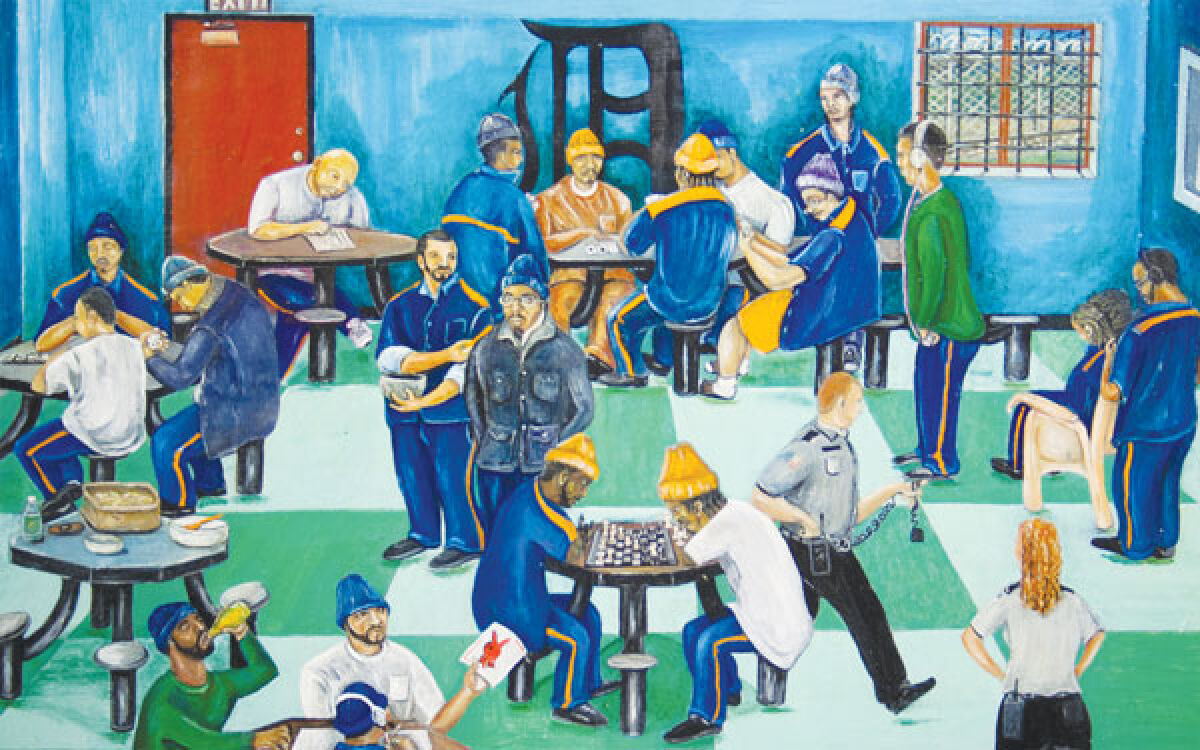DETROIT — Topics such as loss, regrets, injustice and hope are all fruitful inspiration for works of art — even more so for those who have been imprisoned.
An exhibit running at the Museum of Contemporary Art Detroit is working to prove that very point with its Free Your Mind exhibition. The Michigan Justice Fund, a statewide initiative of the Community Foundation for Southeast Michigan, the Eli and Edythe Broad Art Museum, the Prison Creative Arts Project at the University at Michigan and MOCAD are partnering to display the art of currently and formerly incarcerated individuals to demonstrate what that part of our population has to say.
“We wanted to have the exhibition to raise the collective social consciousness around mass incarceration,” explained Ashley Carter, the director of the Michigan Justice Fund. “It’s the work of artists who are part of the Prison Creative Arts Project. It’s a program that works with artists incarcerated in Michigan prisons. One of the things it does is give a voice to those incarcerated as they are removed from society. This program was at Michigan State University before, and we wanted to expand it by bringing it to Detroit.”
Free Your Mind will be displayed in Mike Kelley’s Mobile Homestead at MOCAD, located at 4454 Woodward Ave. in Detroit, through Sept. 10. There is a suggested contribution to MOCAD, but admission is free.
“One of the things we know is that incarcerated people aren’t typically able to communicate with the outside world except for their direct loved one,” said Carter. “This allows them to express themselves in a lot of unique ways. It helps show the pain of incarceration and the impact on families and communities. So much of their art talks about the family experience. Some talk about being incarcerated as a young person. There are up to 3 million people in this state who have been impacted by incineration, so that means 3 million families impacted by this issue.”
Nick Buckingham is among the artists featured as part of Free Your Mind. He said he hopes he can provide some insight into the experiences of incarcerated individuals and shine a light on the realities — positive and negative — of America’s criminal justice system.
“This is something I took part in after being released. I have been working with the Michigan Justice Fund and Michigan Liberation,” he said. “These programs sort of sought me out. For the last eight years, I have done a lot of grassroots work to end mass incarceration. The work I have been doing has attracted some organizations to look at formerly incarcerated individuals differently.”
He was initially invited into the program by Carter and wants this to be a chance to open up the discussion about important topics such as crime, rehabilitation and wrongful imprisonment.
“There are two things happening with the art show,” said Buckingham. “One, it highlights the numerous people who are working to end mass incarceration. It, secondly, allows those who are incarcerated to work through their art. In the culture in the prison system, it’s hard to look at things with a larger perspective. This opens that perspective up.”
“The exhibition is a good place to explore your curiosity, so even if you don’t know anything about these issues, it’s an inspiring introduction to the subject,” Carter added. “It’s a good opportunity to explore those who have gone through these experiences. … We also are using the exhibition as a chance to share with people what they can do to support those reentering society and how they help our efforts.”
Both Carter and Buckingham said that providing such programs for those in prison is crucial as it is not only beneficial to their emotional well-being and mental health, but it also can help serve as a means of addressing the issues that caused them to be locked up in the first place.
“About 95% of people come home from prison, and we want them to come home to meaningfully contribute to society,” said Carter. “Having programs like this allow them to socialize helps cultivate skills for them upon reentry, and it provides healing for the participants, and that healing keeps them from going back to the circumstances that led to them being criminalized.”
“I hope this lets people see those who have been incarcerated as human,” added Buckingham. “A lot of people think of rehabilitation when they think of the prison system, but in a lot of cases, it’s more like putting them in a kennel with no resources. Statistics say 95% of those locked up will come home someday. If you treat them as animals, they will come out as animals. We need to work at restoring these people.”
 Publication select ▼
Publication select ▼























